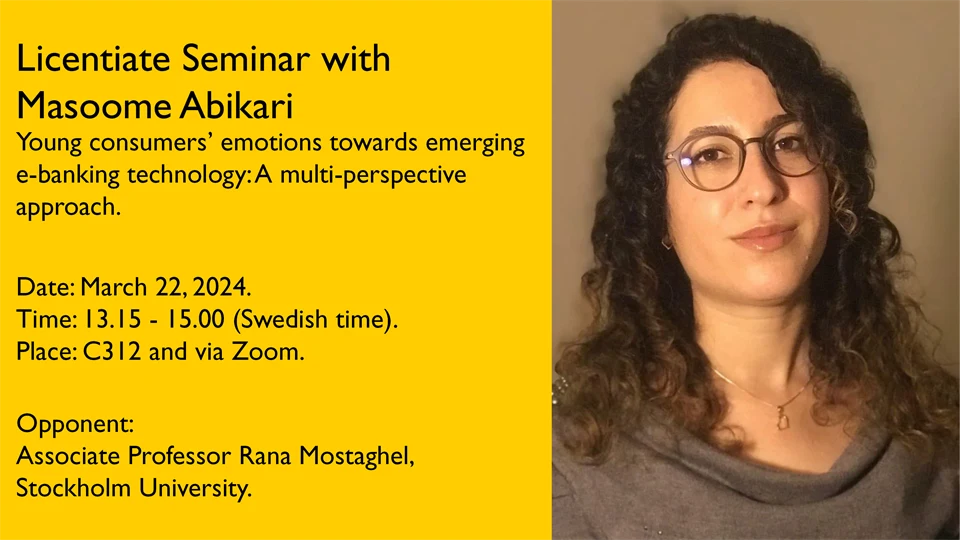Public defence of licentiate thesis with Masoome Abikari
Welcome to the defense of licentiate thesis in Business Administration with Masoome Abikari. She will present her thesis: Young consumers’ emotions towards emerging e-banking technology: A multi-perspective approach".
To attend, please registrate by email: Corné de Beer, corne.debeer@miun.se
Questions? Please contact Masoome Abikari.
Application deadline: March 18th.
Main supervisor: Professor Peter Öhman. Mid Sweden University, Sweden.
Opponent: Associate Professor Rana Mostaghel, Stockholm University.
Grading committee:
- Professor Martijn van der Steen, Universtiy of Groningen, The Netherlands.
- Professor Koustuv Dalal, Mid Sweden University.
- Associate Professor Peter Degerman, Mid Sweden University.
- Associate Professor Malin Holmström-Rising, Mid Sweden University.
Abstract
Banks appear to be interested in enhancing their effectiveness and efficiency by developing e-banking technology, i.e., the provision of banking products and services through electronic channels. However, the successful implementation of e-banking technology depends on how consumers perceive such technology and how they are probably provoked to adopt it. Considering emerging e-banking technologies, knowledge of the salient influential factors affecting consumer adoption is crucial for banks.
Studies have analysed these factors from different perspectives, such as attribute- and barrier-based perspectives. Attribute-based factors pertain to the perceived or expected characteristics of e-banking technology, whereas barrier-based factors refer to factors that can hinder or delay the adoption of e-banking technology. Despite the absence of consensus on these factors, there is a predominant focus on the functional aspects of this technology, often neglecting the emotional experience of consumers.
Consumers’ emotions in the e-banking context mainly refer to hedonic motivation, defined as positive emotions such as fun, pleasure, and enjoyment arising from the usage of e-banking technology. While examining hedonic motivation has provided valuable insights into the adoption of such technology, further studies are required to examine the relationship among consumers’ emotions, particularly negative ones arising from different kinds of appraisals. Accordingly, this thesis aims to examine the influence of consumers’ emotions towards emerging e-banking technology on their intention to adopt such technology, with a specific emphasis on negative emotions from attribute and barrier-based perspectives.
Applying Structural equation modelling (SEM), the empirical results draws attention to the influential role of different types of negative emotions in the adoption of emerging e-banking technology. From the attribute-based perspective, the empirical results demonstrate an association between loss emotions and consumers’ behavioural intention to adopt emerging e-banking technology, through effort expectancy and performance expectancy. From a barrier-based perspective, the results indicate that deterrence emotions can be positively associated with consumers’ perceived risk. This, in turn, influences their behavioural intention to adopt emerging e-banking technology.
The results also reveal the influence of deterrence emotions on consumers’ perceived risk, even in the presence of positive emotions. These results suggest the importance of considering various categories of negative emotions when examining consumers’ intention to adopt emerging e-banking technology.
Contact


